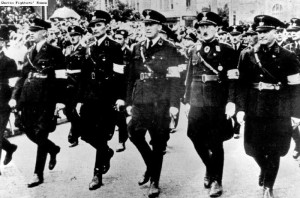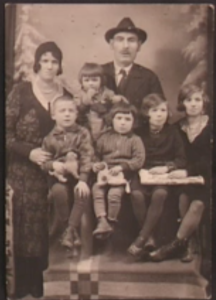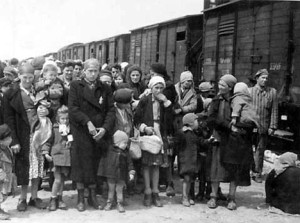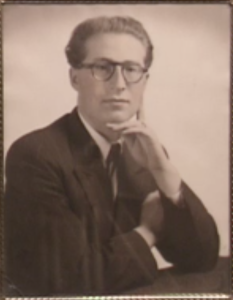"I do not blame any generation of today for what happened."
- Benjamin Wayne
His Early Years
Benjamin Wayne, was born on July 6th 1927 as Vojtech Weinberger, in Michalovce, Czechoslovakia. In his home, they had only a well, but no electricity or running water. Nonetheless his education continued, and he started Hebrew school at the age of five. Because of his Hasidic Jewish heritage, he wore a cap and had his hair styled as a crew cut with the traditional sideburns hanging down. In his words, he was "easily identified as a Jew." On his way to school, he would often encounter other kids throwing stones at him. Benjamin noted a strong anti-Antisemitism that existed where he grew up before the Nazi influence came into Slovakia.
The death of his father at the age of seven did not stop him from pushing on. In 1937, at the age of 10, he took an entrance exam for an institution called "The Gymnasium." The Gymnasium allowed European students to gain 8 years of education with two years of college credit deemed acceptable in America. He passed the exam, and began taking classes 6 days a week, forcing him to work on the Sabbath. This ultimately led to him being removed from his Jewish culture by the local Rabbis, who claimed he was a bad influence.
In 1939, Slovakia broke away from the Czech Republic, and became a protectorate of the Reich and ally of Hitler. There was a rise of Slovakian nationalism that had the same anti-Semitic foundations of the Nazis. This group would eventually become the first Slovakian SS group known as the Hlinka Guard.
He began to notice changes in his own neighborhood; one woman was an outspoken anti-Semite and had her two sons enlist in the SS. In "1940 or 41" Ben Wayne recalls going to school one day and not being allowed to enter The Gymnasium because of his Jewish Heritage. At this time, Jewish people were being dehumanized and removed from civil services. Stores began to be Aryanized; Jews were forced to give up jewelry, radios, and furs; but, "the Jews were hoping they would survive."
"You Cease to be a Child": Benjamin's Struggle in his Hometown
“I skipped over the childhood years because I really didn’t have any childhood years. I had to be politically aware, at all times, that I am Jewish. That I was different." In 1941 all Jews were ordered to wear a yellow armband to identify themselves as Jewish, but a year later the identification became the familiar yellow Star of David stitched to the outside of all clothing. With these came seven o'clock curfews and more restrictions on the Jews and their social lives (i.e. no more than two Jews could walk together in the streets in the town of Michalovce). The deportations of families started in 1942 in Benjamin's town. "The collection of Jews was usually done at night and they gave you 15 minutes to pack what you wanted."
By spring of 1942, in March, all girls and ladies age 16 - 35 are to report and be taken to a labor camp. A few months later, all men of the same age had to report to a labor camp. Benjamin's sister, Maria Weinburger, who had just turned 16, attained fake papers and was re-named Eva Blau. Her new papers said she was younger than 16. It wasn’t smart to do because it said she was still Jewish. Benjamin recalled the various ways people avoided deportation, such as acquiring fake baptismal records from the local Church.
Into Hiding
In his hometown, Benjamin narrowly escaped being sent to a concentration camp on multiple occasions. The first time, Ben was caught on the street by a gendarme who knew he was Jewish. He was taken into the courtyard of the district office where more local Jews were being rounded up. There was a five foot wall that he began to climb using a tree branch, and some of the other Jews helped him over the wall. He landed in the backyard of the gendarme station. “It was a good place to hide in the big garden.” He was there all night. When the transport left, he left through the front gate.
Throughout the years of 1941 - 1943, the Benjamin's sisters, mother, and brother each had hiding separate spots that they would go to when they heard of a roundup/deportation. The local Hlinka guard had a list of where the Jewish families lived; if they requested them, someone from the office would inform the families that a deportation was going to happen. However, one evening, they did not have enough time to disperse. Benjamin and his brother went to his sister's usual hiding place: a compartment that was covered by a pile of lumbar to simply look like a heap of wood. His mother and sister went into a hayloft where, as the Hlinka Guard's stabbed the piles with pitchforks, his mother had some of her hair cut. No one was found.
The third time their capture seemed inevitable was on a Saturday afternoon in 1943. Benjamin was driving horses to help move something from the train station. He saw his mother and sister, and got off the cart to greet them. He noticed two Gendarmes in plainclothes that he recognized, but they were not fooled. The family denied knowing each other, yet they were taken by the two guards without any luggage. As they were about to board the deportation bus, Benjamin's mother said she wanted to sign out to keep a record. The police were trained with an emphasis on keeping good record, so they entered the courtyard and ran into the Captain of the Gendarme who knew the family. He said quietly to Benjamin's mother: "What are you doing here!?" The captain had the family locked up, and by locking them up he saved their lives because the deportation left while they were in jail. The captain later paid people off to have Benjamin and his family released on Monday.
Benjamin and His Family Smuggle Themselves Away
In 1943 Benjamin's family made an attempt to smuggle themselves into Hungary with a guide (for money). They went by wagon and horses into the country, walked 5 Km and boarded a train for Budapest where his mother's relatives lived. However, instead of welcoming them, the relative feared involvement with fugitive Jews and turned them over to the local internment camp. Benjamin was separated from his family, and ultimately sent to another labor camp to be on kitchen duty. As luck would have it, a man showed up at the camp from Benjamin's hometown (find name). The man saw Ben, and said "Wait, I'll get you out of here." Benjamin was assigned to a truck that carried garbage outside the camp, and when the time was ripe, he and the man disappeared.
Benjamin as the Partisan
They went to the HQ for the Jewish community in Budapest, and a few days later Benjamin got an ID card that was the Arrow Cross Party, the Hungarian Hitler Youth. He was a part of a the Jewish underground movements that worked together (such as Va'ad ha-Hatsala "Rescue Committee" or the independent youth group Halutzim) that called on him to deliver things when they needed. Such things they delivered were from their printing shop, where they printed money, fake I.D.s, and legal documents. One evening, he took the bus to deliver a large amount of food stamps, but was caught while trying to get off early. He had forgotten his ID, and was taken to the police. "I admitted I was Jewish because all they had to do was drop my pants to see if I was circumcised or not." While there, he was roughed up a bit, and beaten. However, at 5:00 o'clock in the morning the next day, he was released. "To this day, I do not know why."
During his work with the underground he would work closely with Gestapo and Abwehr offices. The reason was because the Nazis there were "either good, or trying to establish an alibi for themselves for after the war by helping the Jews because by 1944, they already knew the end was coming."
"I’m trying to remember so many things. Many things come back to me at night during my nightmares. Like beatings or dogs barking. It is difficult for me to tell you things right now because I’m simply telling them to you. How I feel though…it’s like I’m in a trans, back in those years."
Ben Goes Home
Sometime late in 1944 he was woken up at 11:00 in the morning and told to be at a train station at 1:00. He was given a telegram from his mother telling him or his family's new address 80 km away from their hometown. He got on the train and encountered three other Jewish refugees, and ultimately chose to stick with a young lady who was also escaping.. On the train he was told to move to the 2nd class car even though he had a 3rd class: “We need this car for the Jews.” He returned to Slovakia. He was 17 at the time. He had no Slovak money. He acquired some through the Jewish offices from a nearby town. He took a train and ended up in the woods with the same lady who escaped from Hungary with him. There was fighting going on. He didn’t dare tell the partisans he was Jewish because they would have killed him.
He made his way to a crossroads where trains were coupled up to go eastward or westward. There, her heard the screams from inside train cattle cars, as well as Jewish prayers. He jumped up on a military train to east, and when he got to the town of his mother's address he jumped off. It was midnight, and only one house was lit:
"Inside the house that was lit, I saw my mother and Lenovich sitting at a table. All I remember is just walking in...the next thing I know, I woke up to my brother sleeping on the floor, the next morning. I was really so lucky, that the day before they had the wagon fully packed ... they had decided to leave that day. But they decided because it was evening, it would look suspicious driving all belongings...with the horses...they decided to leave the next morning in the open. If I had come a day later, I would have never found them...it was ordained."
The End of the War and Liberation
Benjamin and his family ended up at a very nice estate where the owners knew they were Jewish, yet let them live in the stables, which Benjamin recalls were nicer than the quarters of the estate's employees. He needed new ID papers so he thought to go to the village and register himself. He asked if he could join a group of boys playing soccer, and one boy was the mayor’s son to whom Benjamin explain his plight. The mayor made him an ID, and Benjamin went to the SS office to have it stamped and approved. During his time at the estate his mother would cook for the Germans, and they would sleep on the floors of the building. He was told not to speak German because he would mix it with Yiddish. One night one soldier said to another "I feel there is something Jewish in here." The other responded "So what? Forget it, we are already finished." To Benjamin, this was en example of "good Germans." However, he said there were "not so good Germans" and recalls the story of a friend from his hometown who was Jewish and dated an SS officer. On New Years eve 1945 she told him that he was kissing a Jew. Without hesitation, the SS officer dragged her outside and shot her.
“To forgive isn’t my job, it’s God’s job."
During his time at the estate he also went back to Budapest Hungary to get his sister Nancy out of the ghetto. When he got there, he told his sister to leave with him. As they were about to make it past the exit, she said no because others would be punished if she was missing. "They are counting us everyday." Eventually, he managed to get her to escape, and he brought her back to the estate where she hid under bed covers for weeks. By now, the owner of the building was dead.
As the German army was retreating he turned 18 and was old enough to be enlisted and dig fox holes on the outskirts of town, which he did. He was then ordered to go for a draft for the German army in February. He went to the Hungarian commander and said he would rather join the Hungarian army because he did not speak German. The commander then told Ben to forget it and to go into hiding; the Russians would be there soon. He hid in the barn with the tractors when his draft was due; for two days he heard gunshots and war. He came out when everything was quiet and met a Russian soldier who told him everything that happened to Jews all over Europe. His family was reunited back at home in 1945. Between his hometown and Budapest, he frequently went back and forth to ride on the Soviet trucks, who let him on because he wore a red ribbon on his arm calling it “People’s Militia.”
After the war Ben learned that much of his family perished in concentration camps, such as his aunts, uncles, and cousins." It's such a miracle, after the war, to go to bed...and know that no one is going to burst through the door, and take you out. You can go to sleep, and wake up." Benjamin came to the United States on June 14th 1948. His dream was to become a doctor, although he could not continue because of the standards. Instead he became an electrical engineer and worked for the defense services of the U.S. He and the rest of his family came here because his mother's family was living in New Jersey.
"I feel guilty for not being in a concentration camp. I feel guilty for surviving. But if I survive if its for one reason, and it is a paramount reason: to tell people it happened. I was there."
Time Line
- June 6th 1927: Benjamin Wayne is born as Voytech Weinberger in Michalovce, Czechoslovakia.
- 1933: Benjamin begins attending Hebrew school.
- March 1935: General Elections occur: Hlinka's Slovak People's Party elected into majority.
- 1937: Benjamin finished elementary school takes an exam for "The State Gymnasium" and is accepted; begins 8-year program with classes to get college credit in America. He is thrown out of Hebrew school by the rabbis. His older sister Elizabeth gets a visa to go to the U.S and leaves.
- August 1938: Leader of the Slovak People's Party, Andrej Hlinka, dies. Succeeded by ultra-conservative Jozef Tizo.
- September 30th, 1938: The Munich Agreement; a deal between Neville Chamberlain, Adolf Hitler, Benito Mussolini, and French Prime-minister Édouard Daladier gives Nazi Germany permission to annex border territories of Czechoslovakia ("Sudetenland").
- October 1938: Slovakia announces its autonomy. Prague accepts and points Jozef Tizo of the Hlinka party as Prime-minister.
- March 1939: Slovakia declares independence with Hitler's encouragement. Hlinka Guard is created. Harassment of leftist and Jewish parties and peoples begins.
- 1940 - 1941: Ben is not allowed in school; Jews are dehumanized, removed from public offices, and Slovakian gov't takes complete control of all Jewish enterprises. Benjamin and other Jews are forced to wear the yellow star of David
- 1942: Deportations begin in Benjamin's hometown. All girls and ladies age 16 - 35 are to report and be taken to a labor camp. Men follow a few months later. Benjamin's relative Maria Weinberger acquires fake identification.
- 1941 - 1943: Benjamin avoids capture and deportation on three separate occasions. In all circumstances he is arrested by local Hlinka Guards or Slovak Gendarme. Avoids captures with help of locals who knew his family.
- Summer 1943: Benjamin and his family smuggle themselves into Hungary. They are turned in to a local concentration camp by their own relatives and separated. Benjamin escapes because a local family friend is also there; he is put on garbage service outside the camp and escapes when no one is watching.
- 1943 - 1944: Benjamin works for the various underground organizations in Budapest, delivering legal documents, fake I.D.s, and food stamps. He is caught getting off a trolly and taken to an police station, and ultimately released by, maybe, Jewish partisans dressed as SS soldiers, though it is uncertain how.
- Late 1944: Benjamin is sent by the resistance to a different town in Slovakia to find his mother thanks to family friend Lenovich. He finds her and his family, and they move into an estate to hide for the duration of the war.
- 1945: Benjamin finds his sister, Nancy, in the Budapest ghetto and takes her away. They are liberated by the Russians and return to their old home in Michalovce.
- 1948: Benjamin emigrates to the United States.
Author: Bradley Cashman




